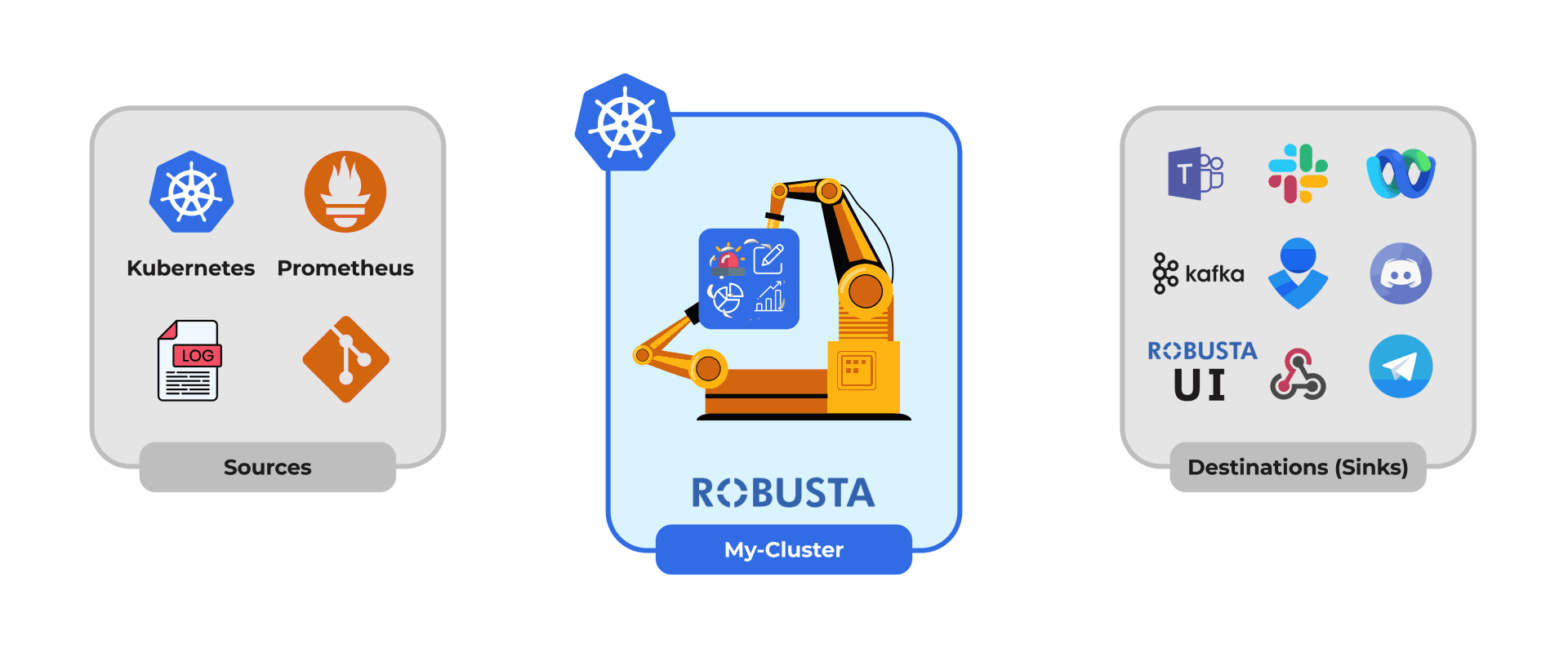Robusta Installation and Configuration
Install Robusta¶
- To configure robusta, the Robusta CLI is required. Choose one of the installation methods below.
Installation Method: PIP
- Python 3.7 or higher is required
Installation Method: Docker
- Generate a Robusta configuration.
- This will setup Slack and other integrations.
If you’d like to send Robusta messages to additional destinations (Discord, Telegram etc.). See Sink configuration.
- Save
generated_values.yaml, somewhere safe. This is your Helmvalues.yamlfile.
Sending alerts to Robusta¶
To configure Prometheus to send alerts to Robusta, add two settings to AlertManager:
- A webhook receiver for Robusta
- A route for the webhook receiver you added
Below is an example AlertManager configuration. Depending on your setup, the exact file to edit may vary. (See below.)
AlertManager config for sending alerts to Robusta:
receivers:
- name: 'robusta'
webhook_configs:
# the following line assumes that Robusta was installed in the `default` namespace.
# if you installed Robusta in a different namespace, replace `default` with the correct namespace
# likewise, if you named your Helm release ``robert`` then replace ``robusta`` with ``robert``
- url: 'http://robusta-runner.default.svc.cluster.local/api/alerts'
send_resolved: true
route:
routes:
- receiver: 'robusta'
matchers:
- severity =~ "info|warn|error|critical"
repeat_interval: 4h
continue: true
Common Mistakes
-
Make sure the Robusta
routeis the firstroutedefined. If it isn’t the first route, it might not receive alerts. When arouteis matched, the alert will not be sent to following routes, unless therouteis configured withcontinue: true. -
Tweak the settings accordingly if:
- You installed Robusta in a namespace other than
default - You named Robusta’s Helm release something other than
robusta
- You installed Robusta in a namespace other than
After you configure AlertManager, you can test it works properly, by creating a demo alert:
Within a few minutes, you should see the demo alert in the Robusta UI, Slack, and any other sinks you configured.
Why do I still see a banner in the Robusta UI that “Alerts won’t show up”?
The notification is displayed until the first alert is sent from AlertManager to Robusta.
Sinks¶
Send alerts to Mattermost:
- configure the mattermost sink
Alert Enrichment¶
Configure automations that enrich and remediate Prometheus alerts.
Robusta comes with many Prometheus enrichments that work out of the box.
SSL Verification¶
By default, Robusta does not verify the SSL certificate of the Prometheus server. To enable SSL verification, add the following to generated_values.yaml:
To add a custom CA certificate, add the following as well:
Additional Resources:¶
https://github.com/prometheus-operator/prometheus-operator/blob/main/Documentation/user-guides/alerting.mdmanaging-alertmanager-configuration
Created : 7 mai 2023
